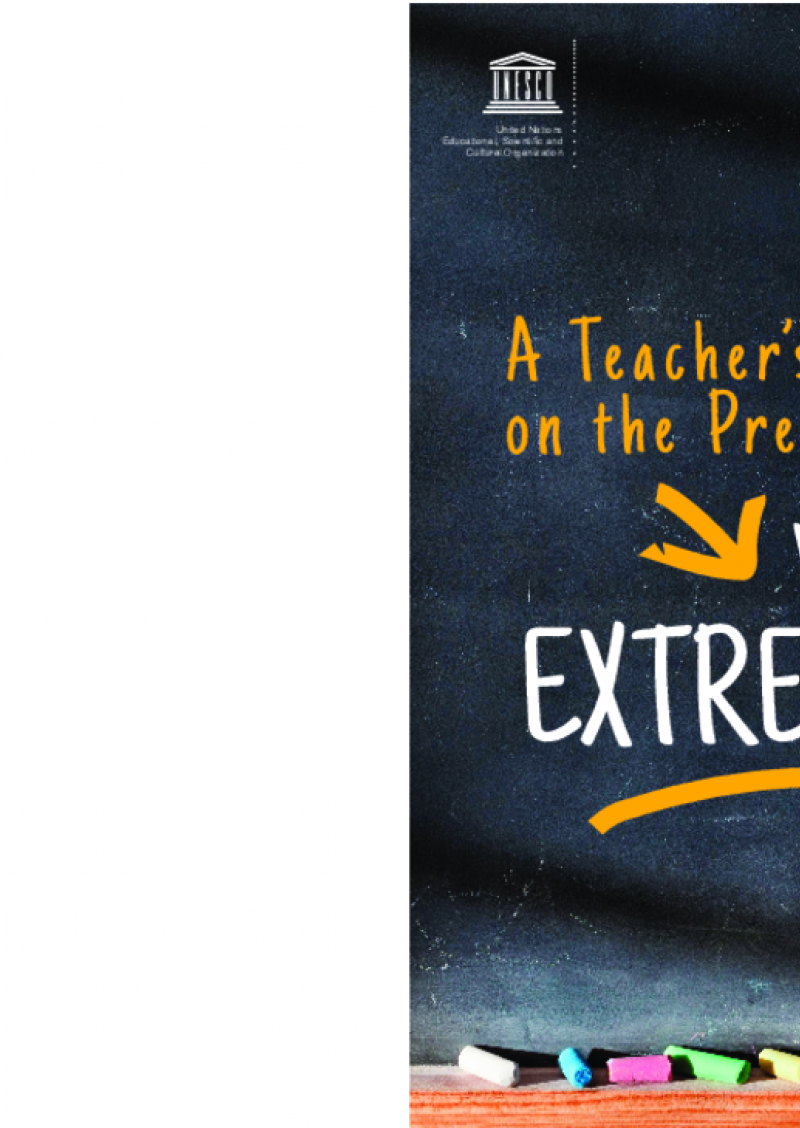Teacher Resource Centre
Displaying 1 - 6 of 6
Youth empowerment for peace and resilience building and prevention of violent extremism in Sahel and surrounding countries: a guide for teachers
This guide is designed to build the capacity of secondary school teachers and teacher educators to integrate a peace and resilience building approach in education for the prevention of violent extremism. It builds on the Transformative Pedagogy for Peace-building guide and it was contextualized to the context the Sahel and surrounding countries.
The guide redefines the role of teachers, inviting them to make a paradigm shift in adopting a transformative pedagogy that allows learners to actively participate in their own learning. Transformative pedagogy builds on active pedagogy and the competencies-based approach. The guide concludes with engaging learning activities to support experiential learning.
A teacher's guide on the prevention of violent extremism
This is UNESCO’s first teacher’s guide on the prevention of violent extremism through education. It was developed in order to ensure its relevance in different geographical and socio-cultural contexts. Therefore, it can be used as it is or further contextualized, adapted and translated in order to respond to the specific needs of learners.
The guide seeks to:
- provides practical advice on when and how to discuss the issue of
violent extremism and radicalization with learners;
- help teachers create a classroom climate that is inclusive and conducive
to respectful dialogue, open discussion and critical thinking.
Dear Kitty: worksheets for the film Where is Anne Frank?
These worksheets are to be used with the teacher's guide "Dear Kitty: teacher's guide for the film Where is Anne Frank?".
Dear Kitty: teacher's guide for the film Where is Anne Frank?
This guide provides teachers with the necessary tools to highlight historical and current themes from the animated film "Where is Anne Frank".
It includes a preparatory lesson, a lesson to discuss the film and four detailed thematic follow-up lessons. The film and the lessons are accompanied by extensive background information and ready-to-use worksheets with information, questions and assignments.
Recommendations for teaching and learning about the Holocaust
Benefiting from the expertise of delegates from more than 30 member countries, the IHRA Recommendations for Teaching and Learning about the Holocaust are intended to provide a basis for policymakers, practitioners, and educators that will help them:
1. Develop knowledge of the Holocaust, ensuring accuracy in individual understanding and knowledge and raising awareness about the possible consequences of antisemitism;
2. Create engaging teaching environments for learning about the Holocaust;
3. Promote critical and reflective thinking about the Holocaust including the ability to counter Holocaust denial and distortion;
4. Contribute to Human Rights and genocide prevention education
Teachers’ self-efficacy in preventing and intervening in school bullying: a systematic review
This article presents a systematic review of existing literature on the extent of teachers’ self-efficacy in managing bullying and its connection to the likelihood that teachers will intervene in bullying, to their intervention strategies, and the prevention measures they employ, as well as students’ bullying behavior and their experiences of victimization.
The study presents practical implications in relation to teacher initial education and professional development: teachers with higher self-efficacy tend to intervene more often in bullying situations, so it's important that teacher training programs are designed to support teacher's self-efficacy, through the use of appropriate methods, such as the use of role-play to practice specific professional behaviours.





